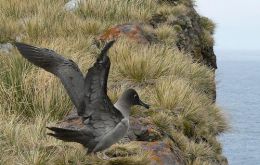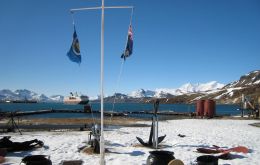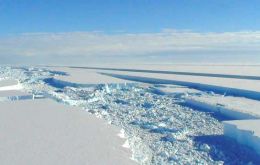MercoPress. South Atlantic News Agency
Antarctica
-
Tuesday, September 15th 2009 - 02:30 UTC
Scientists confirm link between declining CO2 levels and Antarctica ice cap

The link between declining CO2 levels in the earth's atmosphere and the formation of the Antarctic ice caps some 34 million years ago has been confirmed for the first time in a major research study.
-
Friday, September 4th 2009 - 07:50 UTC
Sooty albatross set breeding record in South Shetland Islands

A small group of light-mantled sooty albatrosses has set a new breeding record. The birds have created a colony on King George Island, one of the South Shetland Islands located in Antarctica.
-
Thursday, September 3rd 2009 - 10:30 UTC
Antarctica’s Ridge A, world’s coldest, driest, calmest place on Earth

The search for the best observatory site in the world has led to the discovery of what is thought to be the coldest, driest, calmest place on Earth, a place where no human is thought to have ever set foot. The finding was detailed on August 31 in the Publications of the Astronomical Society.
-
Monday, August 31st 2009 - 08:00 UTC
Third “expedition cruise” vessel for Australis from Punta Arenas

The Chilean cruise company Cruceros Australis which operates from Punta Arenas is having a third vessel built in Valdivia which should be operational for the 2010/2011 season, according to Branco Ivelic, manager of Cruise Operations.
-
Thursday, August 27th 2009 - 08:38 UTC
South Georgia attracted 7.700 tour visitors during the 2008/09 season

The annual Tourism and Visitor report for the 2008/9 season shows that despite more tour ships than ever visiting South Georgia Island last season, overall cruise passenger numbers fell slightly.
-
Tuesday, August 18th 2009 - 13:24 UTC
German research vessel will operate year round in Antarctica

The next five to six years will represent a great infrastructure and logistics leap forward for Antarctic activities mainly because of the greater technological advances of the scientific research vessels, according to Professor Heinz Miller a distinguished academic from Germany’s Alfred Wegener Institute for Polar and Marine Research.
-
Monday, August 17th 2009 - 08:06 UTC
Developing countries lead greater scientific interest in Antarctica

A greater movement of people and cargo can be expected in the future from the extreme south of Chile, beginning this coming season, as a direct consequence of increased Antarctic activities anticipated Jose Retamales, head of the Chilean Antarctic Institute.
-
Friday, August 14th 2009 - 13:51 UTC
Large Antarctic glacier thinning four times faster than ten years ago

One of the largest glaciers in Antarctica is thinning four times faster than it was 10 years ago, according to research seen by the BBC. A study of satellite measurements of Pine Island glacier in west Antarctica reveals the surface of the ice is now dropping at a rate of up to 16m a year.
-
Monday, August 10th 2009 - 12:07 UTC
British Antarctic Survey in new bid to fly from Falklands

The British Antarctic Survey (BAS) is standing by its policy to use the Falkland Islands as its gateway to the frozen continent. That’s the message delivered by John Pye, head of logistics at BAS, who was in the Islands for a whistle-stop visit at the weekend.
-
Thursday, August 6th 2009 - 03:40 UTC
The future of Antarctic science will depend on international cooperation

The National Antarctic Programs have reached a consensus that international cooperation will be the clue for the future development of polar science. This is the main topic of discussion at the XXI Annual Meeting of the Council of Managers of Antarctic Programs (COMNAP), especially with increased costs associated with support, logistics and infrastructure necessary to carry out the scientific research in the White Continent.
